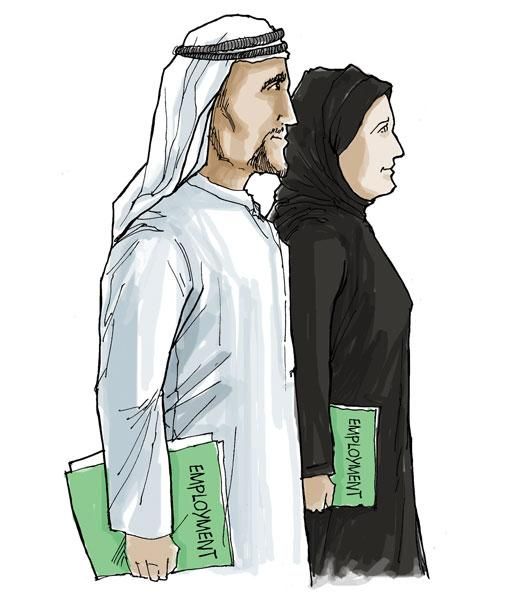Emiratisation is back in the spotlight. Last week, the Cabinet discussed a study on human resources in the federal government and instructed the Federal Human Resources Authority to draft a comprehensive plan for Emiratisation in the government sector, in line with the federal government's strategic plan.
The study indicates that Emirati women employed by the federal government account for 53 per cent of the national workforce. It also recommends the preparation of a detailed and complete plan that considers the administrative and financial factors in implementing a policy of Emiratisation within the federal ministries and organisations.
For the last few years, I have followed the development of Emiratisation and observed the remarkable efforts of the Cabinet through its programmes and policies. However, it is essential to clarify that many countries have adopted policies aimed at increasing the number of their nationals employed in both the public and private sectors. The Kingdom of Saudi Arabia, Kuwait and the Sultanate of Oman, in addition to the UAE, have all implemented various programmes.
This situation came about in these countries because of their relatively small native population, which was not sufficient to meet human resources requirements. Thus, there has been a remarkable influx of foreign employees that has influenced the equilibrium between nationals and expatriates in favour of the latter. At the same time, the number of national graduates and job seekers has been increasing, which has put economic and social pressure on the governments. In response to this situation, the aforementioned four countries have established policies that aim to create an appropriate balance between nationals and expatriates within their local labour markets.
In the UAE, there was the establishment of the Committee for Human Resources Development in the Banking Sector (CHRDB) in 1997, and the National Human Resource Development and Employment Authority, Tanmia, in 1999. While the CHRDB aims to ensure that 50 per cent of banking jobs are taken by UAE citizens, Tanmia focuses on developing the capabilities and skills of the UAE's manpower in order to create the required balance in the labour market.
Tanmia works as a coordinator between Emirati job seekers and employers in the private sector. Tanmia's other goals include generating job opportunities for UAE nationals, reducing unemployment, improving the skills and productivity of the national workforce and proposing appropriate policies to the federal government for the further implementation of Emiratisation.
For years, the mission of Emiratising the federal government was the major task of the Council for Civil Service. This has since become the function of the Federal Human Resources Authority, which was established by the Cabinet within the strategy of the government initiated by His Highness Shaikh Mohammad Bin Rashid Al Maktoum, Vice President and Prime Minister of the UAE and Ruler of Dubai.
In the meantime, the local governments in Abu Dhabi and Dubai have established two key programmes that aim at contributing to the federal policy of Emiratisation. In Abu Dhabi, there is the Abu Dhabi Emiratisation Council (ADEC), which focuses on achieving sustainable employment for every Emirati job seeker. ADEC's mission is to ensure that every Emirati job seeker finds a job, to be the trusted facilitator between job seekers and the private and public sectors and to be the trusted labour market policy advisor to the Abu Dhabi government.
In Dubai, the Emirates National Development Programme (ENDP) aims to become the catalyst for the widespread integration of UAE nationals into the private sector, for the prosperity of the private sector and the wellbeing of the nation. ENDP will build partnerships between Dubai's private sector and UAE nationals aimed at promoting the recruitment and long-term retention of nationals.
The above policies and initiatives reflect the robust, continuous and comprehensive efforts by both the Cabinet and the local governments to implement an effective policy of Emiratisation. However, I believe further action is required to coordinate federal and local policies.
I think Emiratisation would be enhanced if information was shared between the federal and local authorities within a comprehensive national database. Research should be conducted to explore the developments in both the public and private sectors.
An action plan should be drawn up on both the federal and local levels that takes into account the requirements of Emiratisation. Finally, more effective relationships should be established between the private higher education institutions and the public and private sectors in order to ensure that higher education outcomes match the needs of the labour market.
I believe the UAE needs a new strategy of Emiratisation that reflects the current economic climate. In other words, the policy of Emiratisation that was introduced in the late 1980s needs to be critically re-evaluated and modified in order to serve what has been outlined in the federal strategy of the Cabinet.
Abdullah Al Shaiba is a UAE national academic and thinker.











